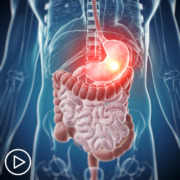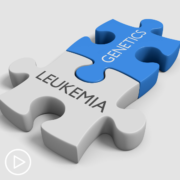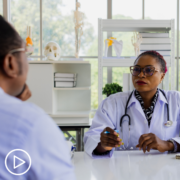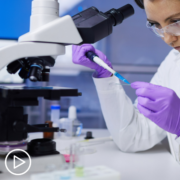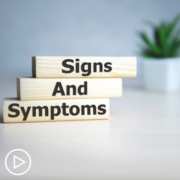An Overview of Current Gastric Cancer Treatment Options
An Overview of Current Gastric Cancer Treatment Options from Patient Empowerment Network on Vimeo.
Treatments for gastric cancer have expanded in recent years, providing new options for patients. Dr. Yelena Janjigian, a specialist and researcher, shares an overview of available gastric cancer therapies and outlines the different treatment classes.
Dr. Yelena Janjigian is Chief of Gastrointestinal Oncology Service at Memorial Sloan Kettering Cancer Center.
See More From INSIST! Gastric Cancer
Related Programs:

|
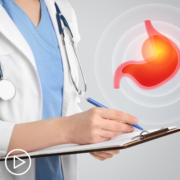
Factors to Consider When Choosing a Gastric Cancer Treatment Approach |
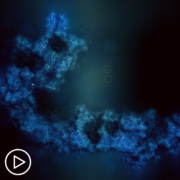
How Do Biomarker Test Results Impact Gastric Cancer Treatment Options? |
Transcript:
Katherine:
Okay. I’d like to move onto current gastric cancer treatment options. Can you provide an overview of what’s available now?
Dr. Janjigian:
Right. So, in patients with intermediate or early-stage tumors, really surgery is the main way to cure patients. Occasionally when we have an amazing response to chemotherapy or chemotherapy with immunotherapy or just immunotherapy, we can avoid surgery. But in most patients, surgery in early-stage disease is a gold standard for cure. Of course, it can be a very jarring thing to say to someone. “We have to take out. your stomach.” But patients do live without either fully their stomach removed or partially removed. And that’s the gold standard. We do additionally other treatments to help maximize chances of cure, but surgery is the main state. As I mentioned earlier, most of our patients, however, present with later stages where surgery is not feasible.
And when I say it’s not feasible, we would only attempt an operation if we thought there was a possibility of removing the cancer completely. Leaving some of the tumor behind, even if it’s only 1 percent of the cancer behind, makes patients unwell. They may not be able to tolerate additional chemo, so we do not recommend doing suboptimal surgery unless cancer can be completely removed. So, in those patients, we always explain the situation.
And the disease is not potentially as curable, but it’s absolutely always treatable. And since the development of our immunotherapy options, really, we’ve changed the trajectory and the course of those cancers. We won’t know the stage or the final response to therapy until we’ve start it. But in those patients, usually a form of long-term therapy. Chronic treatment is very important.
And usually it involves a combination of chemotherapy and some targeted agents, biologic agents, meaning that they were designed in the lab to target the cancer specifically. And usually, they involve some sort of immunotherapy.
Katherine:
Excuse me. Can you go into some detail about the targeted therapies and immunotherapies that you use?
Dr. Janjigian:
Sure. So, conventional chemotherapy works on any rapidly dividing cell. And these are chemotherapies that have been tried and true in the clinic for decades, right? And they work still in gastric. And in particular they’re very important. And then over the last 10 years or so, we’ve started developing target agents in the lab that target the specific biologic tumor biomarkers. And when you think about tumor biomarkers, I would think about them as almost ZIP codes, right? How do you direct the cancer cell to die?
And how do you inhibit the cancer cell for the thing that is uniquely what’s making it grow as opposed to normal cells, right? So, that’s the difference between chemotherapy because chemotherapy can affect any rapidly dividing normal cell and cancer cell, while biologic agents ideally only affect the target, cancer, the cell. So, that’s why it’s very appealing to do both to help maximize response and survival on treatment. So, the biologic therapies that are available in and already approved in our disease for stomach cancer are something called HER2 directed treatments.
And that’s been my focus in the lab. And then in my group has really spearheaded a lot of this research for HER2-positive tumors. In gastric cancer it occurs in up to 20 to 30 percent of tumors, but we have drugs such as trastuzumab or Herceptin, T-DXd, trastuzumab deruxtecan-nxki (Enhertu) or in HER2 that target these agents.
And furthermore, our work here at Memorial Sloan Kettering demonstrated the combination therapies really for HER2-positive disease has helped improve outcomes in those patients. So, that’s biologic therapy. Other biologic therapies that’s approved in gastric cancer is something called VEGFR-2 inhibitor. These are drugs that target blood vessel formation around the tumor to help the chemotherapy drugs work well and better. Those drugs are called ramucirumab or Cyramza. And that’s used in a combination of chemotherapy in second-line treatment. And there’s other drugs such as regorafenib (Stivarga) and other inhibitors that maybe have some targetable activity in our disease. And last but not the least is immunotherapy. So, immunotherapy’s a completely different class of drugs.
We think about immunotherapies, really the fundamental problem with cancer, right? The cancer issues that it started as a normal cell. So, at some point, it was a normal cell that then became and went awry and went rogue. And the body did not recognize that there was a problem. And the immune system did not eliminate that cancer cell. Before it started to metastasize and give us problems in their body, right? So, the fundamental question is why is the body’s immune system, why did it not recognize it as a abnormal cell?
Well, because it really acts and looks like a normal cell from the immune perspective. Our immune system is trained not to hurt us, right? And that’s why in patients with rheumatoid arthritis or other autoimmune disorders, what happens is the immune system goes awry. So, what the immune checkpoint blockade or immunotherapy for cancer does, is it helps take some of those brakes off our immune system and help our immune system recognize the cancer and give it permission to say, “Hey, you know what?
You thought it was a normal cell. It’s not. It’s a cancer cell. Please help us eliminate it.” And that’s worked well because I think in for some of our patients, the immune system actually knows how to target and suppress the cancer much better than any of the fancy drugs we can design in the lab.
And that’s why in some patients, immune checkpoint blockade immunotherapy has been such a game changer if you do respond, your duration and durability of response is so much more better than anything that would go to just done on our own in the lab or with other chemotherapies. So, it really is a nice way to think about it. And the patients feel like they’re part of the solutions. It’s always nice for them to have that.
But it’s been a real game changer for both HER2-positive and HER2-negative disease in combination with chemotherapy. I’ve had the pleasure of leading some of these studies. And it’s nice to be able to update the three or the four or the five-year survival rate from these studies in a disease where in the past most patients died within a year.

